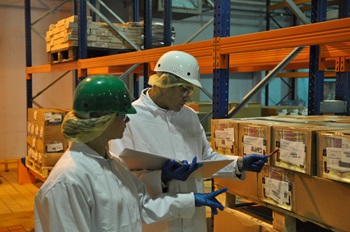
In today’s complex and dynamic business environment, the role of food internal auditors has become increasingly crucial. As companies strive to maintain compliance with food safety regulations, manage risks, and uphold the highest standards of quality and integrity, the need for skilled professionals who can effectively audit and monitor food safety management systems has never been greater. Pursuing a food internal auditor course can provide individuals with the necessary knowledge, skills, and credentials to excel in this important field. In this article, we will explore the significance of pursuing such a course and highlight ten key reasons why it is worth considering.
-
Industry Demand: The food industry is heavily regulated, with stringent requirements for food safety and quality management. As a result, there is a growing demand for qualified internal auditors who can help companies ensure compliance with these regulations. By completing a food internal auditor course, individuals can position themselves as valuable assets to employers seeking to maintain the highest standards of food safety and quality.
-
Specialised Knowledge: A food internal auditor course provides participants with specialised knowledge and expertise in food safety management systems, regulatory requirements, and industry best practices. This knowledge is essential for conducting effective audits and identifying potential areas for improvement within food manufacturing, processing, and distribution operations.
-
Risk Management: Food safety is a top priority for companies operating in the food industry. By becoming certified internal auditors, professionals gain the skills to assess and mitigate risks associated with food safety hazards, contamination, and regulatory non-compliance. This proactive approach to risk management can help companies avoid costly recalls, legal issues, and damage to their reputation.
-
Compliance Assurance: Regulatory compliance is a complex and ever-changing landscape in the food industry. Certified internal auditors are well-versed in relevant regulations, standards, and guidelines, enabling them to ensure that companies adhere to applicable requirements and maintain proper documentation of their compliance efforts. This helps companies avoid fines, penalties, and other consequences of non-compliance.
-
Quality Improvement: Internal audits play a critical role in driving continuous improvement in food safety and quality management systems. By systematically reviewing processes, procedures, and practices, internal auditors can identify opportunities for enhancing product quality, efficiency, and customer satisfaction. This focus on quality improvement is essential for maintaining competitiveness in the marketplace.
-
Professional Development: Pursuing a food internal auditor course is an excellent opportunity for professional development and career advancement. By acquiring new skills and credentials, individuals can enhance their marketability and open up new opportunities for growth and advancement within the food industry. Certified internal auditors often command higher salaries and are in high demand by employers seeking to strengthen their food safety and quality management capabilities.
-
Global Recognition: Many food auditor courses are based on internationally recognized standards and guidelines, such as those developed by the International Organization for Standardization (ISO) and the Food and Drug Administration (FDA). By completing a certified auditor course, professionals gain global recognition for their expertise and qualifications, opening up opportunities for employment and collaboration on a global scale.
-
Networking Opportunities: Participating in a food auditor course provides individuals with valuable networking opportunities within the food industry. They can connect with fellow professionals, industry experts, and potential employers, fostering relationships that can lead to future collaborations, job opportunities, and professional growth. Networking is an essential aspect of career development and can greatly enhance the value of pursuing a certified internal auditor course.
-
Career Versatility: The skills and knowledge acquired through a food auditor course are highly transferable across various sectors of the food industry. Certified internal auditors can work in food manufacturing, processing, distribution, retail, and other related fields, providing them with a diverse range of career options and opportunities for specialisation. This versatility is especially valuable in today’s rapidly evolving job market.
-
Return on Investment: While the certified internal auditor course fees in India may vary depending on the provider and the duration of the program, the investment in pursuing such a course can yield significant returns in terms of career advancement, salary potential, and job satisfaction. The skills and credentials acquired through a food auditor course can pay dividends throughout one’s career, making it a worthwhile investment in professional development.
Summing Up
In conclusion, pursuing a food auditor course offers numerous benefits for individuals seeking to establish themselves as trusted professionals in the food industry. From industry demand and specialised knowledge to risk management and career versatility, the significance of such a course cannot be overstated. By investing in their education and acquiring the skills and credentials needed to excel in this critical field, individuals can position themselves for long-term success and make a positive impact on the safety, quality, and integrity of the food supply chain.
The Food Internal Auditor Course offered by FICSI stands out as the premier choice for individuals seeking top-tier training in food safety management systems auditing. FICSI’s course curriculum is meticulously crafted to provide participants with the most relevant knowledge, skills, and tools needed to excel as food internal auditors. With experienced instructors, hands-on learning experiences, and industry-leading resources, FICSI ensures that graduates are fully prepared to meet the challenges of auditing in the food industry. Choose FICSI for the best food internal auditor course and embark on a rewarding career journey in ensuring food safety and quality compliance.





